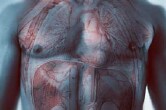 |
 |
 |

Artery Plaque Rupture Can Occur Without Symptoms
But this makes build-up more vulnerable to future bursts, researchers find|
|
HealthDay
By Robert Preidt
Friday, September 5, 2008
 FRIDAY, Sept. 5 (HealthDay News) -- Plaque ruptures in arteries can occur without causing any symptoms, say researchers at Boston University School of Medicine.
FRIDAY, Sept. 5 (HealthDay News) -- Plaque ruptures in arteries can occur without causing any symptoms, say researchers at Boston University School of Medicine.
Atherosclerotic plaque often develops at branch points or curving portions of arteries, where blood flow is slowed and more turbulent. Plaque development is common in the carotid arteries, which supply the head and neck with oxygenated blood. The sudden rupture of artery plaque can lead to complete artery blockage that causes a heart attack or stroke.
The researchers reported about a patient with severe blockages in both the left and right carotid arteries. The patient was examined prior to operations to remove the plaque in both arteries.
Two months after removal of the left carotid artery plaque, the patient experienced plaque rupture in the right carotid artery. But the patient didn't suffer a stroke or any other symptoms. This is likely because the blood clot didn't grow large enough to block the flow of blood the brain, the researchers said.
"This illustrates the healing of silent atherosclerotic ulceration, which is a specific type of rupture detected by MRIs over a period of two months," project leader James Hamilton, a professor of biophysics and physiology, said in a school news release. "This has not been reported previously. In the past, there had been evidence of plaques removed from the carotid and human coronary artery through postmortem specimens that small plaque ruptures may occur without notice."
Hamilton and colleague Alik Farber, chief of vascular and endovascular surgery at Boston Medical Center, said these hemorrhages "disappear" into the plaques but make the plaque more vulnerable to future rupture.
The study was published in the Sept. 2 issue of Circulation.
HealthDay
Copyright (c) 2008 ScoutNews, LLC. All rights reserved.
Related News:
More News on this Date
Related MedlinePlus Pages:
| Home | Health Topics | Drugs & Supplements | Encyclopedia | Dictionary | News | Directories | Other Resources | |
| Disclaimers | Copyright | Privacy | Accessibility | Quality Guidelines U.S. National Library of Medicine, 8600 Rockville Pike, Bethesda, MD 20894 National Institutes of Health | Department of Health & Human Services |
Date last updated: 08 September 2008 |




